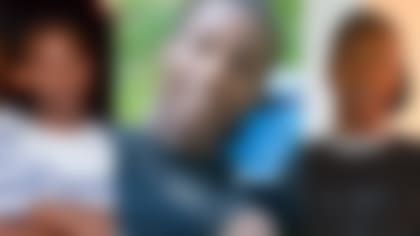He protected him from a world of drugs and violence, but Shaun Wade's close friend couldn't save himself. Now, the Ohio State cornerback vows to keep Jacoby Wright's memory alive forever.
By Chase Goodbread | March 29, 2021
JACKSONVILLE -- The name is Jacoby Joshua Wright. Shaun Wade knew him well.
The case number is 857597, and Wade doesn't want that to be all there is for people who didn't.
There is so much more to know about Jacoby Wright, Wade insists; so much more that inspires, motivates and even now, five years after his death, evokes laughter in Ohio State's star cornerback.
But none of those qualities are listed anywhere in Case No. 857597.
To all who didn't truly know him, and few did -- Wade and a small circle of friends called him Coby for short -- Wright is indeed a number now as one of 113 homicides in Jacksonville from 2015. The hard facts are these: a Florida Highway Patrol officer noticed the 17-year-old's arm extending from brush that was obscuring his body on a dirt road adjacent to a dead-end street on Jacksonville's Northside, shortly after 3 a.m. on Dec. 20, 2015.
He was a long way -- nearly a half-hour drive -- from his Westside neighborhood, where he'd met Wade and others who cared for him about seven years earlier. He died of gunshot wounds, including one to the head. Police found Wright wearing a black T-shirt and blue jeans, and believed the body was moved at least 12 hours before it was discovered, barefoot and surrounded by little more than a few abandoned mobile homes. On his chest was a tattoo of his mother's name, Felicia, and on his arm, the Lord's Prayer. And perhaps the hardest fact of all came years later when, among those 113 Jacksonville killings from 2015, Wright's is one of 16 classified by police as a justifiable homicide.
Wade, the latest in Ohio State's long line of defensive backs bound to hear his name called in the NFL draft, didn't know much about the Coby Wright described in the police report. And that's exactly the way Wright wanted it. Wade's future in football shined brightly at a tender age, and Wright took protecting and defending it very personally. So anytime Wright thought danger might be afoot, he never allowed Wade anywhere near it, least of all in the last few months of his life when the streets began to consume him.
Wade never knew that Coby. Never even spoke to him, really.
Their last conversation was roughly five months before Wright died, as Wade pleaded with him to pursue enrolling at Trinity Christian Academy. The two had hoped to be football teammates in the fall of 2015 there, where Wright, Wade believes, could have earned a football scholarship himself and started down a path other than the one that ended off a cold, dead-end street.
Wade keeps his friend's memory alive the best he can.
For four years, he's worn the No. 24 for the Buckeyes in his friend's honor; 24 was Wright's number as an AAU basketball player. He's memorialized him with the letters B.L.I.C., written anywhere from his wristbands to the backplate of his shoulder pads. Five years after his death, he still can't make sense of it. But with his Ohio State career now behind him, Wade is revealing for the first time what the No. 24 and B.L.I.C. -- Ballin' Like I'm Coby -- mean to him.

With a sly grin, Wade must scan the full depth of his memory to answer the question: What is the worst trouble you've ever been in?
It's been awhile.
He finally harkens back to a fight he got into in the second grade, about a year after he'd moved to the United States from Italy, where the U.S. Navy had his father, Randy, stationed for several years. He "took a whooping" from his grandfather over the altercation, but that's it. He can't recall being in any hotter water with his parents or elders than that.
Randy Wade describes his son's upbringing as sheltered, and Shaun doesn't deny it. Randy and his wife Gwen paid close attention to the friends their son chose, but they probably didn't need to, because Shaun always had his own instinct for steering clear of the wrong crowd and the problems that came from it.
"I used to tell coaches, if you see Shaun walk away, something's about to go down," Gwen said. "He's not going to snitch; he'd keep a secret. But he wasn't going to put himself in the middle of trouble."
“Shaun was always the golden boy. He’s a natural-born leader and the guy in our group who would always make the right decisions in life. Coby knew we all had careers ahead of us, but especially Shaun.” D.J. MATTHEWS
Wade and Wright were different that way.
Wade was an introvert, Wright the extrovert. Wade was prone to good decisions; Wright, at times, to bad ones. Wade wasn't a fighter, but Wright -- known to be fiercely protective of his friends -- wasn't the least bit hesitant to throw hands.
Wade was a star athlete who played, and excelled, above his age group in both football and basketball. He played on a national championship Pop Warner football team, four state championship teams at Trinity, and for elite AAU basketball programs. Wright was every bit the athlete Wade was, but wasn't as accomplished at sports. Wright didn't necessarily see himself as a college student, much less a college athlete. But in his core group of friends, which included several who would earn scholarships in football or basketball, he saw Wade as the one most destined for greatness.
"Shaun was always the golden boy," said D.J. Matthews, who was a star teammate of Wade's at Trinity and was signed by Florida State as a four-star wide receiver recruit. "He's a natural-born leader and the guy in our group who would always make the right decisions in life. Coby knew we all had careers ahead of us, but especially Shaun."
Wade's positive influence on those around him had an impact on Matthews, who first introduced Wade and Wright when the three played in the youth football hotbed of Jacksonville's Westside. According to those close to the two, Matthews' personality had too hard of an edge, while Wade's edge was a bit too soft. Being around one another tempered each in just the way that was needed.
"Shaun needed to be opened up a little more, and D.J. needed to see more of a family structure," Randy Wade said.
Wade hoped to have the same impact on Wright that he and his family had on Matthews, but it was easier said than done. Wright was a free spirit with a bold personality. His charisma had a magnetic effect on those around him. By all accounts, he was a mix of conflicted traits: likeable but troubled, generous but hot-tempered. And not the type to change who he was for anyone.
"That was definitely my goal," Wade said, "to make him understand there's more to life than what he was living."

Wright once told Wade he loved him enough to kill for him.
The comment hit Wade in two ways. On one hand, it laid bare a depth of loyalty that he couldn't fully comprehend but had no choice but to appreciate. On the other hand, it was a frightful realization, because Wade knew his friend wasn't joking.
"It scared me to hear that, but it showed what I meant to him, what he had for me," Wade said. "He felt like I could be something more in this world."
Travis Moss, Wright's AAU basketball coach, was the closest thing Wright had to a dad. His biological father lived in Alabama and rarely saw his son, and Wright used to call his coach with best wishes every Father's Day.
Last December, Moss sat on a leather couch in his home, at the end of a cul-de-sac street on Jacksonville's Westside, and watched Memphis' football game against Tulane with interest; his son Travis is a freshmen linebacker for the Tigers. His eyes largely stay on the game, but for two hours, he speaks only about Wright, who he calls his fifth son -- Moss has four of his own -- and the efforts that went into guiding him. Anger management was a definite problem for the teenager, and Moss believes it largely stemmed from his father's absence. Wright once told Moss he was the only person who could snap him out of a fit of anger.
"He had his mom, who worked hard and was always there for him," Moss said. "But I did think he was one of two players on my team who I thought basketball might have to save."
“That’s who he was. If you disrespected someone close to Coby, you disrespected Coby.” TRAVIS MOSS
Wright relished in defending those closest to him, sometimes to a fault. Among those who knew him, an oft-repeated story recounts an incident at an AAU basketball tournament at Disney's ESPN Wide World of Sports complex in Orlando, where Wright was playing for Moss' team, Jacksonville-based Team Blueprint.
An iPhone was stolen from one of Wright's teammates, and the 15-and-under Team Blueprint squad suspected that it was taken by someone on a U-17 team that had been sitting near them between games. With the older team having already taken the bench for its next game, one of Wright's teammates called the missing phone, and its ringtone could be faintly heard in the direction of the U-17 team bench. A visibly angered Wright, without the first thought that the other team's players were bigger and stronger, marched straight to the court and, without a word, began opening and dumping out their gym bags, which were lined up behind the bench. He emptied a couple before anyone noticed, and a couple more while the U-17 players watched in shock as a stranger rifled through their belongings. Arguing ensued, then gave way to confrontation as a few players from Team Blueprint stepped between the bags and the bench to prevent the older team from stopping Wright's bag-by-bag inspection.
Just as the altercation began to get too heated to control, Wright discovered the stolen iPhone in what Moss recalls as the eighth or ninth bag his player had emptied.
"That's who he was," Moss said. "If you disrespected someone close to Coby, you disrespected Coby."
On the floor, things were no different.
He wasn't a good shooter, but his style of play was said to be Dennis Rodman-like -- defense, rebounding, pouncing on loose balls. And if his teammates took an excessively hard foul, he enforced with a harder one. That made Wright an anomaly in the AAU ranks, where the order of the day for recruiting attention starts with three-pointers and ends with dunks.
Wright's game wasn't attracting college coaches, but it naturally endeared him to teammates.
That's a trait of Wright's that Wade says he's taken on, that the people closest to him aren't just to be loved; they're to be defended as needed. When he walks into the Buckeyes locker room, he senses more of a brotherhood with his teammates than he would have had he never met Wright.
"I can say that, definitely, I feel I owe more loyalty to the people who do right by me," Wade said.

Moss spoke at Wright's funeral and told mourners this: "If you just met Jacoby within the last six months, you didn't know the real Jacoby."
Moss looks at Wright almost like two different people; the one he mentored and guided for the better part of seven years and the one who lost his way over the final months of his life. At the Builders of Faith Christian Center, the day after Christmas and just three miles from the park where Jacoby played youth football, it was the former Coby who was memorialized.
Moss believes Wright's bad temper and willingness to fight gave him a reputation as a delinquent, but he insists that Wright didn't live a truly dangerous lifestyle until he completely fell away from organized basketball.
"Sports kept him out of trouble, like a lot of kids," Moss said. "And he never really cared about having money, so he didn't need the street life as much."
The Wright described in Case No. 857597, however, became desperate for it.
The Coby Wright that Moss remembers routinely went out of his way to help the homeless or people in need. Wade recalls a trip to Las Vegas for an AAU basketball tournament, in the summer of 2015, where Moss had taken Team Blueprint to eat at In-N-Out Burger. Wright was the hungriest -- he was the one who had asked Moss to stop -- but gave his meal away to a homeless person he spotted near the restaurant.
"Sometimes five, ten dollars would be all he had in his pocket, but if someone needed it more than him, he'd give it away," Matthews said. "I've seen him give a stranger his last."
To Wade, B.L.I.C. -- Ballin' Like I'm Coby -- is about more than playing sports with Wright's aggressive and selfless approach to basketball. It's also about the qualities he had that should be known to anyone who knew him only by Case No. 857597.
"One thing I took from him, something my parents taught me, too, was to put other people ahead of yourself," Wade said. "That's the way he was."
In sports, Wright had become used to the view from behind. In his core of friends were Wade, the two-sport star bound for greatness, and Matthews, a four-star football recruit, both of whom led Trinity Christian to a fourth straight state title in 2016. There were others, including Mike McDougal, an undersized point guard who played in college and coined the term B.L.I.C.
Wright didn't have the shooting touch to play college basketball, nor the size at 6-foot-3 to play a Rodman-style game at that level. He stuck to what he was best at -- basketball dirty work -- while others scored and shined. Chronic headaches ultimately dissuaded him from the collision contact of football, and he didn't like school much, anyway. His friends were all moving on, and there was a certain understanding that Wright wouldn't be joining them as college athletes. He used to tell them all, Wade especially, that he'd come to every college game of theirs that he could.
He was OK with it.
"Not a jealous bone in his body as far as that goes," said Wade's father, Randy.

Blame went all around when Wright was killed, but fingers didn't all point at someone else.
Some pointed to self.
Wade blamed himself for nearly a year, convinced he didn't do enough to talk his friend into enrolling at Trinity Christian to play football with him. Wright spent half of his last summer living with the Wades. He was training with the team regularly in summer workouts with the intention of enrolling, and Wade couldn't have been more excited to not only be his teammate but for sports to continue playing a desperately much-needed role in his close friend's life. After weeks of training, not long before preseason practice was to begin, Wright suddenly said he was through with football.
He likely had to be.
Longtime Trinity coach Verlon Dorminey, who coached Wade on four of his eight state championships, recalled an enrollment snag of some kind for Wright but couldn't remember if it was related to academics, tuition affordability or something else. One day, without further word, Wright left the Wade home and never returned.
Wade never spoke to him again. He'd have liked to, but Wright didn't own a cellphone, so he couldn't be contacted easily.
"I feel like if I had just spoken up and said, 'No, you're staying with me and playing football,' he wouldn't have ended up in the situation he was in," Wade said.
“We’ve got to let kids know you can’t be on both sides, with one foot in sports and another in the street. Because if you’re in between, you’re really just in the street.” RANDY WADE
Wade stayed in his bedroom for hours at a time after Wright's death. Not one to typically show emotion, he came home from the funeral, closed his bedroom door and cried. It was one of only two times his family had seen that kind of pain in his face -- the other was when his younger brother Latrell suffered a gruesome ankle dislocation in a Trinity football game.
Moss blamed himself as well. The two had gotten into an argument over Wright's academics upon their return from the Las Vegas AAU tournament. He wanted to test Coby and challenged him to straighten out some things in his life on his own, and thus asked the Wades if Wright could stay with them temporarily. They fell out of touch until a few weeks before Wright's death, when Moss received a random series of texts from multiple cell numbers he didn't recognize. It was Wright, who used others' phones to text or call people.
"It was five or six texts in a row. He poured his heart out, said he didn't want to live the street life anymore, said 'It's rough out here,' which was unlike him," Moss said. "We started talking some again and I was hoping to get him back into basketball. I carried a burden about it for a long time."
On the day Moss watched his son's Memphis team against Tulane, Randy Wade watched Shaun record his second interception of the season for Ohio State with a beautiful diving grab. He nipped at a drink following the Buckeyes' 52-12 rout of Michigan State, as a massive, four-screen projector covered most every inch of his living room wall with sporting events. In an adjacent room, full of workout equipment, he's covered red-painted walls with photos, certificates and all manner of keepsakes from the athletic careers of his children and their friends. Among the photos is one of Miami Dolphins wide receiver Isaiah Ford, a former Trinity Christian star who, as a senior, used to drive Wade to school in the morning.
Randy reflects on the structure he and Gwen provided his family, the role sports played in it, and the things they've done to help kids from disadvantaged backgrounds. He points to Wright's favorite spot on the couch. He wants Wright's story told because he knows there are kids who need to hear it.
"We've got to let kids know you can't be on both sides, with one foot in sports and another in the street," Randy Wade said. "Because if you're in between, you're really just in the street."













